
by Laurie Osgood | Aug 2, 2022
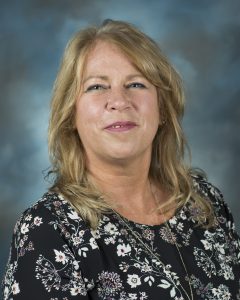
Laurie Osgood, UF/IFAS Extension Gadsden County
Hello, I am Laurie Osgood, the UF/IFAS Family and Consumer Sciences (FCS) Extension Agent in Gadsden County. I have worked in Extension for over 8 years, with seven of those years in the Gadsden County office. My FCS program areas include health and wellness and financial capability.
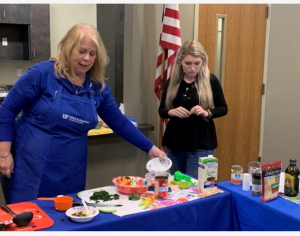
I hold a bachelor’s degree in Dietetics and have recently completed my master’s degree in Family, Youth and Community Sciences from the University of Florida.
As an Extension Agent, I enjoy working with families and youth across the state of Florida and in Gadsden County.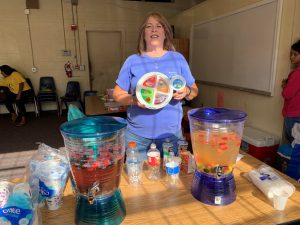 It is very rewarding to be able to offer health and wellness programs that benefit families in my community. Working as an Extension Agent has been one of the most gratifying experiences of my career.
It is very rewarding to be able to offer health and wellness programs that benefit families in my community. Working as an Extension Agent has been one of the most gratifying experiences of my career.

I have been married to my husband, Gary, for over 25 years and we have three children, which includes a set of twins. All three of my children are currently seeking their college degrees. We have two rescue dogs that are as much work as children.
My hobbies include working in my garden, traveling, and visiting Florida breweries.


Laurie Osgood on a trip to Paris.

by Julie McMillian | Jan 13, 2022
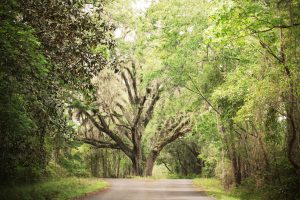
Trees help to clean the air and provide a relaxing setting to reduce stress.
Photo credit: Anitra Mayhann
Do you know how vital trees really are? Trees conserve soil and water and clean the air. Research has shown that there are both mental and physical health benefits from forests. Trees provide us with oxygen through photosynthesis. Not to mention, think of the beauty they add to an area. Florida has celebrated Arbor Day for many years, since 1886 to be exact. It is the third Friday in January, whereas the National Arbor Day is the last Friday in April.
We can improve our health just by spending time outside in nature. Forests and trees can boost our immune system, reduce stress, increase our ability to sleep as well as boost energy levels while improving mood and helping us to focus. Studies in health care show a link between nature and health. Plants put off airborne chemicals called phytoncides to repel insects. The antifungal and antibacterial qualities that are put off in this process help us as we breathe them in by increasing our white blood cell count.
It is important that we remove ourselves occasionally from our office or home to explore green spaces to take a mental break. That might mean a walk in the forest, gardening, exercising, or resting and meditating to unplug from our fast-paced busy life. Many doctors encourage and incorporate this type of therapy for wellness for their patients and for children diagnosed with attention deficit disorder.
There are many ways to celebrate trees. They are a great gift for birthdays, holidays, or anniversaries. You might also consider planting a tree in honor of a family member who has passed on or to remember a beloved pet. This year, give a gift that gives back as well as be encouraged to celebrate Florida’s Arbor Day on January 21st, 2022.
Many holidays celebrate something we remember, but Arbor Day is a way to celebrate hope for the future by planting a tree to support a healthy community. I encourage you to check with your local government offices, Forrester, or Extension office to see if there are any special celebrations planned that you could join or plan your own activity to honor trees as a resource and how they impact your environment.
For more information, visit Arbor Day Foundation or Florida Urban and Community Forestry.

by Claire Davis | Oct 26, 2021
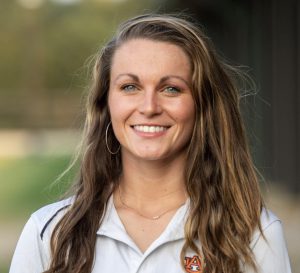
Photo Source: Auburn University IHSA Equestrian Team
Claire Reach is the UF/IFAS 4-H & Family and Consumer Sciences (FCS) Agent in Calhoun County, Florida. For 4-H, she specializes in animal handling, animal safety, and animal sciences. For FCS, she mainly specializes in food safety and healthy living, but has found a new opportunity to work with First Time Homebuyers and the State Housing Initiative Partnership Program (SHIP) in the county.
Claire grew up in Alabama, splitting her time between Birmingham and her family’s farm, L & L Angus Farm, in Auburn. The family farm is Claire’s driving force behind the passion that she has for agriculture, which is a large part of the work she is doing in Extension.
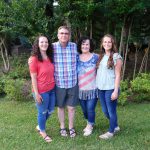
These pictures are of my family on the farm in Auburn, AL. Photo Source: Dave Davis.
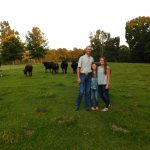
Peep some of the cows in the background. Photo Source: Elise Reach.
With a family background in Ag, she decided to study Animal Science-Production Management at Auburn University in Auburn, Alabama. While completing her undergraduate degree, Claire competed for Auburn University’s Intercollegiate Horse Show Association, worked at Auburn University’s College of Veterinary Medicine in a research barn, and continued to work on the family farm. She graduated in May of 2019 with her Bachelor of Science and a minor in Agricultural Business.
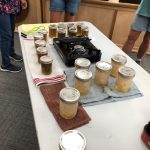
Several home cooking/canning classes offered in 2021. Strawberry jam, chicken, pepper jelly, salsa, and mozzarella cheese have been made! Photo Source: Claire Reach UF/IFAS.
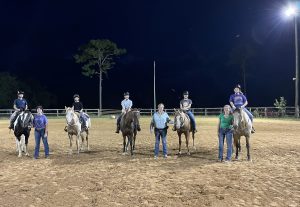
The Calhoun County 4-H Horse Club recently started up! (The 2 horses on the right side of the image also belong to me.) Photo Source: Dave Davis.
Shortly after graduation, she moved to Florida to work for Deseret Cattle and Timber as a Heavy Machinery Operator, but soon realized that her passion was Extension. The position in Calhoun County became available and she jumped at the opportunity to apply for it. Having just started in May 2021, Claire has not been with UF/IFAS Extension long, but she cannot wait to see what the future holds for her county. Claire says that she aspires for the Calhoun County FCS Program to be the area’s leading program for adults in practical home practices, whether that be home canning or healthy eating, and healthy living. All the programs that she offers, whether it be 4-H or FCS, follow the same motto: ‘learn by doing’. This drives the experience of each program, allowing participants to fully understand a concept or ask questions when they do not.
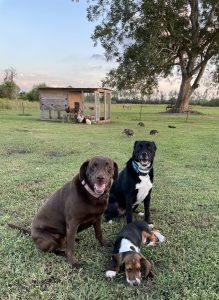
These are the “goodest” dogs of all time! Evie (Chocolate Lab), Diesel (Black and White Mutt), and Hank (Bassett Hound-laying down) Peep the chickens, turkeys, cat, and horses in the back ground! Photo Source: Claire Reach UF/IFAS.
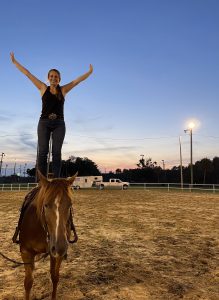
This is Chick! For a mare, she’s pretty special. We have a great bond and she trusts me to do just about anything with her (i.e. shoot a gun off of, rope cattle, stand on, lay on, or let little kids ride) Photo Source: Tanner Mayo.
When Claire is not at work, she says there is always more work to be done at home. Living on a functioning livestock operation, she has several animals, including: chickens (about 50 at the moment), 5 guineas, 4 turkeys, 2 cats, 4 dogs, and 3 horses. She hopes to be able to add cattle to the ever-growing “funny farm” soon! It isn’t always about work, though. In her spare time, Claire enjoys spending time with family, riding her horses, long walks with the dogs, dirt road riding, and paddle boarding at the beach!

by Melanie Taylor | Sep 29, 2021
Until July 2, 2021, I felt confident I had done everything possible to stay safe and avoid contracting Covid-19. Throughout 2020 and well into 2021, I worked from home, socialized very little, quarantined when necessary, wore my mask, and constantly washed my hands. In fact, I may have dry skin on my hands for the rest of my life, but I still wash my hands frequently. The Covid-19 virus has become a controversial issue over the past two years, but my story is from real experience.
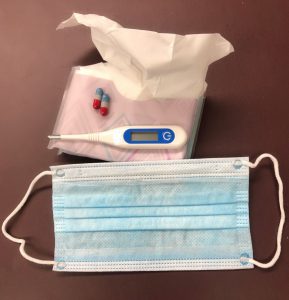
Keeping your fever under control is a necessity when battling Covid-19. Photo credit: Melanie Taylor
As I prepared to have a safe, but fun, Fourth of July weekend with a few vaccinated friends, I was winding down my Friday at work and started to feel achy. I headed home, excited for a 3-day weekend, but I still felt like I was dragging. My husband and I had plans to meet up with friends at a restaurant with outdoor seating, but before I left the house, I decided to take my temperature, just to be cautious. To our surprise, I had a fever of 99.9. We canceled our dinner plans and I took some acetaminophen, went to bed early, and we prayed it was not Covid-19. It was kind of an unspoken prayer because neither of us wanted to admit we were a little nervous about my symptoms. As the weekend carried on, I felt sicker as the hours and days went by and barely left the sofa or bed. On Sunday morning, I woke up with a bad dry, hard cough so my husband called my doctor. To be totally transparent, I am immunocompromised, so we both knew there was a chance I could have a breakthrough case even though I was vaccinated. Based on my symptoms, my doctor recommended I go to the emergency room and be evaluated since it was a 3-day weekend. I followed his directions, had a chest x-ray, which, thankfully, was clear, but I tested positive for Covid-19.
Let me honestly say, this was the sickest I had ever felt in my memories. For about twelve straight days, I laid on the sofa, took my temperature and oxygen levels, had no sense of taste or smell, ate food with no taste to keep up my strength, hydrated, and slept. The body aches, fever, dry cough, and fatigue were debilitating. I had every Covid-19 symptom listed by the CDC except for a headache. I thought to myself many times how bad and scary this could have been if I had not been vaccinated. My doctor clearly expressed his opinion that if I had been unvaccinated, I would have been hospitalized, no questions asked. Unlike many people, it was not recommended for me to take a regimen of pills or vitamins, so I fought it with acetaminophen, lots of hydration, healthy foods, and tons of rest. When I finally woke up on July 14th and could smell the coffee brewing, I knew the end was finally in sight. It still took two more weeks to feel and return to normal, and I knew firsthand this virus is no joke.
Like many of you, I know people that have tested positive and showed no symptoms, some that felt very sick but were able to stay home and recover, and some that never made it home from the hospital. I work in the field of science as a UF/IFAS Extension Agent and feel very strongly that we can all make simple efforts to reduce exposure to ourselves and others. The most important step is to pay attention to the symptoms and stay home if we suspect illness or exposure. Even though I was looking forward to the holiday festivities, I made a conscious decision to stay home on July 2nd just in case I really was positive with Covid-19. I wanted to keep my friends and family safe just in case there was a remote chance I was contagious. I feel very grateful I did not expose them to this virus.
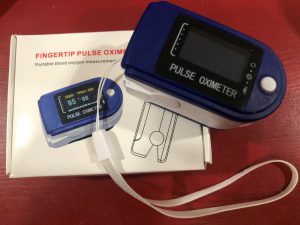
Checking your oxygen levels while sick with Covid-19 is a must. Photo credit: Melanie Taylor
The positive cases in Florida are lower right now, and that is fantastic. I am very excited about it too, but I also know we still shouldn’t put our guard down. Please stay aware. Be aware if you or a family member(s) have been exposed or do not feel well, and check for symptoms. I highly recommend every American household have a reliable thermometer, a pulse oximeter (safe oxygen levels should not go lower than 92), fluids for hydration, and foods of different textures because eating food without being able to taste and smell is very difficult. Different food temperatures, spice levels, and textures made eating to keep up my strength easier for me to handle.
The past two years have been stressful, emotional, and very exhausting. We still cannot forget to stay aware and diligent in our everyday lives to keep our families, friends, and communities healthy. Please revisit these CDC websites as needed and always consult your doctor when you have questions and concerns. Stay aware and healthy out there!
https://www.cdc.gov/coronavirus/2019-ncov/your-health/index.html\
https://www.cdc.gov/coronavirus/2019-ncov/symptoms-testing/symptoms.html
https://www.cdc.gov/coronavirus/2019-ncov/prevent-getting-sick/index.html
https://www.cdc.gov/coronavirus/2019-ncov/testing/index.html
https://www.cdc.gov/coronavirus/2019-ncov/if-you-are-sick/index.html
https://www.cdc.gov/coronavirus/2019-ncov/need-extra-precautions/people-with-medical-conditions.html

by Julie McMillian | Aug 27, 2021
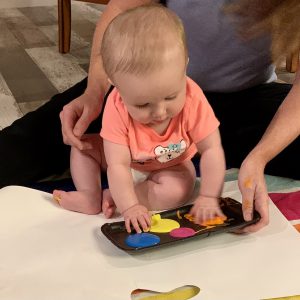
Fingerpainting Baby Sensory Photo Source: Julie McMillian
In the early childhood years there are key experiences that are essential to development. Babies and toddlers benefit from sensory activities and it is important for overall health and well-being. When does sensory development start? The answer is before we are born. Everything we do as humans involves our senses. In a child’s first five years, sensory play supports cognitive development, language, problem solving, and social and emotional interaction as well as motor development. Research shows that sensory play is needed for children to develop more complex learning abilities as they grow.
During the first twelve months, an infant begins to build an understanding of their world. It can seem like a challenging time because they are often exploring with their mouth. There are some simple activities that are both safe and entertaining for babies at this age.
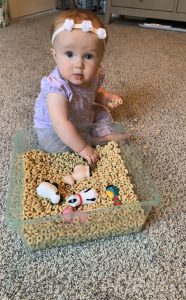
Baby Sensory Bin Photo Source: Julie McMillian
Sensory bins are hands-on interactive tools that use sight, touch, taste, hearing and smell. A sensory bin can also be used to hide and find objects which creates an opportunity to encourage language development. Fine motor skills can be developed by using the pinching, grasping, scooping, pouring, and stirring movements with a variety of tools. Sensory bins can be inexpensive and switched out easily to create strength and hand development.
Sensory Bin Ideas
- Sponges and Water
- Cooked pasta with food coloring
- Dry Cereal with or without toys
- Oobleck (2 cups cornstarch and 1 cup water)
- Gelatin
Outdoor sensory play is another great way to use multi-sensory experiences for healthy child development. Outdoor equipment at home or the park can be used. Simple experiences with grass, sand and water encourage exploration and creativity. A reserved child may come out of their shell when outdoors. Nature opportunities will provide health benefits of fresh air, exercise, and vitamin D.
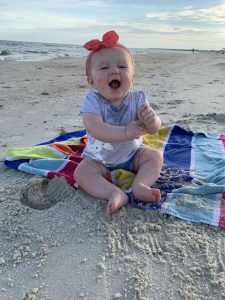
Baby Sensory Outdoors Photo Source: Julie McMillian
Outdoor Sensory Ideas
- Sit in the grass
- Crawl in the sand
- Smell the flowers
- Touch the leaves
- Take a nature walk
- Have a picnic
- Read a book
As a care giver, you can focus on a certain skill that may be lacking in a child’s development or provide an array of activities that stimulate growth. When children can explore and try new experiences they can attach meaning and unlock key skills needed for their future. Sensory play is valuable and essential for learning and the activities are endless.

 It is very rewarding to be able to offer health and wellness programs that benefit families in my community. Working as an Extension Agent has been one of the most gratifying experiences of my career.
It is very rewarding to be able to offer health and wellness programs that benefit families in my community. Working as an Extension Agent has been one of the most gratifying experiences of my career.




















